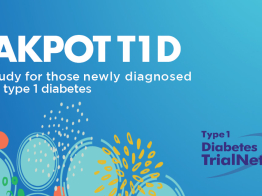Study Details Currently Enrolling
TrialNet researchers are testing two different treatments – abrocitinib and ritlecitinib – to see if either or both can preserve insulin production in people (ages 12-35) newly diagnosed with type 1 diabetes (Stage 3 T1D).
Abrocitinib and ritlecitinib are in a new class of autoimmune treatments called Janus kinase (JAK) inhibitors. Abrocitinib is approved by the U.S. Food and Drug Administration (FDA) to treat eczema. Ritlecitinib is being studied as a treatment for several autoimmune diseases, including alopecia, ulcerative colitis, Crohn’s disease, vitiligo, and rheumatoid arthritis.
Researchers believe abrocitinb and ritlecitinib may be able to calm the immune system response that harms beta cells. Located in the pancreas, beta cells are responsible for making insulin. Continuing to make even a small amount of insulin helps keep blood glucose levels in the normal range, lowering the risk of long-term complications.
If either or both treatments are successful, these JAK inhibitors may be studied in earlier stages of T1D to see if they can prevent or delay clinical diagnosis.
As with any medical intervention, there are benefits and risks to participating in this study. Before you join the study, a TrialNet team member will explain all potential benefits and risks and answer your questions.
Who Can Participate
This study is enrolling people who are:
- Age 12-35
- Newly diagnosed with T1D (in past 3 months)
- Up to date on required vaccines (including the flu vaccine when it is available)
- Not pregnant, breastfeeding or planning to become pregnant while in the study
AND have: - One or more diabetes-related autoantibodies
- Hemoglobin A1C ≤ 10%
- C-peptide detectable during a mixed-meal tolerance test (MMTT)
These are the study’s main eligibility criteria. A member of your research team will review the full list of criteria with you prior to your screening visit.
Participant Experience
This study will enroll 78 people newly diagnosed with T1D. Two thirds of the participants will receive active treatment: 26 will get abrocitinib; 26 will get ritlecitinib. The other third, 26 people, will get a matching placebo (looks like the study treatment but has no active ingredients); this is the control group. Treatment will be randomly assigned—neither the participants nor the study team will know who is receiving what treatment until the end of the study.
This study has two phases: treatment and follow up.
Treatment (1 year)
You will take a daily oral tablet containing the study treatment (abrocitinib, ritlecitinib, or placebo) for 1 year. During this time, you will visit a study site every 3 months for tests and monitoring (6 visits minimum, including the baseline visit).
During most study visits, you will have a Mixed Meal Tolerance Test (MMTT) to measure how much insulin your body is making. This test involves drinking a liquid meal containing proteins, fats and carbohydrates, followed by a blood draw. An intravenous (IV) catheter is used for the blood draw, so there’s only one poke while small samples are collected over 2 hours. Because you cannot have food or drink (other than water) before an MMTT, these visits will take place in the morning.
Follow up (1 year)
In the study’s follow up phase, you will visit the study site for monitoring every 6 months for 1 year (2 visits minimum). All participants will receive guidance for intensive diabetes management.
Benefits of intensive diabetes management
Studies have shown that keeping blood glucose levels within a healthy range reduces the risk of long-term complications. It might also help any remaining beta cells continue to make some insulin.
Participants in the JAKPOT T1D Study will be expected to wear a Continuous Glucose Monitor (CGM) for 2 weeks after each study visit, including the first screening visit. If you don’t have a CGM, we will provide you one.
How to sign up
You can let us know you’re interested in the JAKPOT T1D Study by filling out this form. A member of the TrialNet research team will contact you to discuss your eligibility. If this study isn’t right for you, we’ll let you know about other current or upcoming new onset studies.
If you have questions about this study or TrialNet, please email us: info@trialnet.org.






